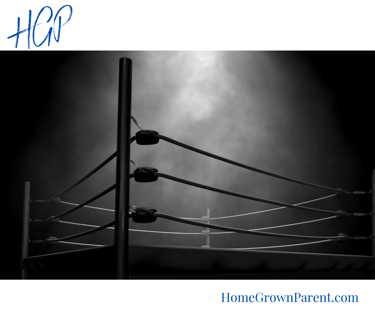Stress vs. Gratitude: A Battle for Your Mind
If stress and gratitude were boxers, they’d be lifelong rivals, two warriors locked in battle for control of your mind, body, and future. Their fight isn’t just metaphorical—it’s biological, psychological, and deeply personal.
SELF
Gary Crispin


The Arena Is Set
If stress and gratitude were boxers, they’d be lifelong rivals, two warriors locked in battle for control of your mind, body, and future. Their fight isn’t just metaphorical—it’s biological, psychological, and deeply personal.
Stress steps into the ring first, fists clenched, fueled by the demands of life, the weight of responsibility, and the fear of what comes next. It’s got history on its side—millions of years of evolution, fine-tuned to keep us alive. Stress whispers urgency, pushes adrenaline through our veins, and keeps us alert. But its greatest trick? Convincing us we need it.
Gratitude, on the other hand, is the underdog. It doesn’t yell, doesn’t shove. It stands with an easy confidence, knowing its power is quieter but deeper. Gratitude is not urgency; it is understanding. It is not reaction; it is presence. And in this fight, gratitude doesn’t need brute strength—it only needs to remind us that we have a choice.
The bell rings. Let’s see who wins.
Round One: The Fight for Your Mind
Stress comes out swinging. Its first move is dominance—when stress rises, it hijacks the brain’s prefrontal cortex, the part responsible for decision-making, problem-solving, and emotional regulation. Suddenly, everything feels more overwhelming. Small problems balloon into crises. Our ability to think clearly is compromised, and reaction takes the place of response.
Gratitude counters with a direct hit to the same brain region. Studies show that practicing gratitude strengthens the prefrontal cortex, allowing for better emotional control, improved problem-solving, and a heightened ability to reframe negative experiences. In other words, while stress clouds your ability to think, gratitude sharpens it.
And here’s where gratitude lands its first real blow: The brain cannot fully process stress and gratitude at the same time. One will always outmatch the other. Stress may be fast, but gratitude is patient, and patience always wins in endurance.
Round Two: The Sleep Battle
This is where stress shows its cruelty. It doesn’t let you sleep. Instead, it lurks in the back of your mind, turning over conversations, regrets, and fears like a gambler shuffling cards. When stress is high, cortisol levels spike, making it harder for the body to enter deep sleep. This means less time spent in REM sleep—the stage where long-term memories are processed and stored. Over time, stress weakens memory, making it harder to recall details and stay mentally sharp.
Gratitude steps up, effortlessly countering. Studies show that people who reflect on what they are grateful for before bed not only fall asleep faster but also sleep longer and experience better sleep quality. Why? Because gratitude lowers cortisol and increases serotonin and dopamine—neurotransmitters that signal safety and relaxation. When the brain feels safe, it allows for deep, restorative sleep, giving memory the chance to solidify and the body time to heal.
So while stress keeps you awake, gratitude tucks you in.
Round Three: The Physical War
Stress may not throw visible punches, but inside, it’s brutal. When prolonged, stress weakens the immune system, increases inflammation, and raises blood pressure. It accelerates aging by shortening telomeres—the protective caps at the ends of DNA strands. High stress levels even change the brain’s structure over time, shrinking the hippocampus, the area responsible for memory and learning.
Gratitude takes these hits and throws them right back. Practicing gratitude has been linked to lower blood pressure, reduced inflammation, and a stronger immune system. More impressively, gratitude has been shown to increase telomere length, essentially slowing down cellular aging. Where stress breaks the body down, gratitude builds it up.
Round Four: Memory and Focus
Stress tightens its grip, reminding you of its most sinister move: how it rewires the brain. When stress is chronic, it creates an overactive amygdala, the fear center of the brain. This heightened activity makes us hyper-aware of threats, real or imagined, keeping us in a cycle of anxiety. The ability to focus suffers, and over time, the brain loses efficiency in forming and recalling memories.
Gratitude doesn’t just break this cycle—it rewires the brain in the opposite direction. Neuroscience confirms that regular gratitude practice strengthens neural pathways linked to positive thinking, emotional resilience, and problem-solving. Gratitude also enhances neuroplasticity, the brain’s ability to adapt and rewire itself.
So while stress makes the brain reactive, gratitude makes it adaptive.
Round Five: The Emotional Showdown
Stress tries to remind us that it’s necessary. That without it, we’d be unmotivated, stagnant, or unprepared. But here’s where gratitude delivers the knockout punch.
Gratitude does not eliminate responsibility or challenge—it simply shifts the perspective. A grateful mind sees opportunity where a stressed mind sees burden. A grateful heart finds meaning in difficulty, while a stressed one only finds exhaustion. Gratitude doesn’t take away problems, but it gives us the strength to navigate them without being consumed by them.
And here’s the final truth: Stress will always exist. But gratitude—if cultivated—can make stress irrelevant.
And the Winner Is…
Gratitude. Every time. Stress is loud, but gratitude is lasting. Stress burns hot and fast, while gratitude builds a foundation that sustains. Stress makes life feel urgent; gratitude makes it feel full.The choice is ours. Every moment, every day, we are in the ring. But if we choose gratitude, we don’t just win the fight. We change the game.
contact@homegrownparent.com
Copyright 2025
Subscribe on Youtube
Follow on Facebook


